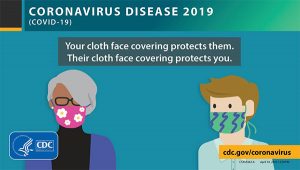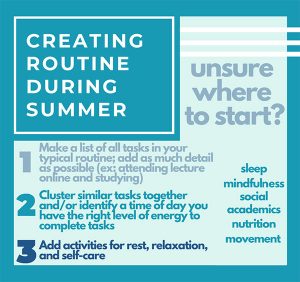
Timely health and well-being information, helpful tips and tricks, education, and meaningful stories from healthcare providers, educators, and the students they serve.
#BeWellUGA at Home: Quarantine and Chill? Dating During Social Distancing
Follow these tips for dating and relationships during social distancing: Don’t feel pressured to date right now. Swiping on dating apps, texting, holding a conversation, and going on dates can be emotionally draining. Take your time for yourself and pursue people and relationships when you have the energy and motivation!

#BeWellUGA at Home: Eating Well During Times of Stress
Anyone on social media can see how social distancing is impacting the way we eat; with many restaurants closed or limited to takeout-only options, folks took to the kitchen. Stores sold out of flour as people whipped up banana bread and sourdough starters with their newfound time at home. As

UMatter and Your Actions Matter!
While celebrating the end of the school year, enjoying the start of summer, and navigating businesses re-opening, we all play an active role in keeping our community safe.
CAPS Cares: Personal Stories & Helpful Topics for Dealing with COVID-19, part 4
Wondering how CAPS counselors are personally handling COVID-19? In part 4 of this video series, they’ll speak to you about how they’re doing and talk about topics that may be helpful to you during these times.

CAPS Cares: The Power of Pets in the Time of COVID-19
As a more recent addition to the CAPS team, it didn’t take long for me to realize that the CAPS team loves their pets. Photos are shared, stories are told, and quirky pet personalities are described in great detail. Our pets are an integral component of our self-care practices now

#BeWellUGA at Home: Finding a Routine During the Summer
If you’re feeling the impact of a new schedule or lack of structure, it can be helpful to create a routine that includes time for things you have to do and things you want to do. It can take a little time to land on a routine that feels best
#BeWellUGA at Home: Stocking a Nutritious Pantry
A nutritious diet supports physical and mental well-being. Join our UHC Health Promotion Department registered dietitian nutritionist in this video series to talk about stocking a nutritious pantry to maintain a healthful diet, minimize trips to the grocery store, and cook delicious meals at home.

Maintaining a Low-Waste Lifestyle During COVID-19
Sustainability is a priority at the University of Georgia and for many students, faculty and staff. If COVID-19 has you concerned about maintaining a low-waste lifestyle or perhaps has you rethinking some of your habits, we’re here to help and support you.
CAPS Cares: Personal Stories & Helpful Topics for Dealing with COVID-19, part 3
Wondering how CAPS counselors are personally handling COVID-19? In part 3 of this video series, they’ll speak to you about how they’re doing and talk about topics that may be helpful to you during these times.
